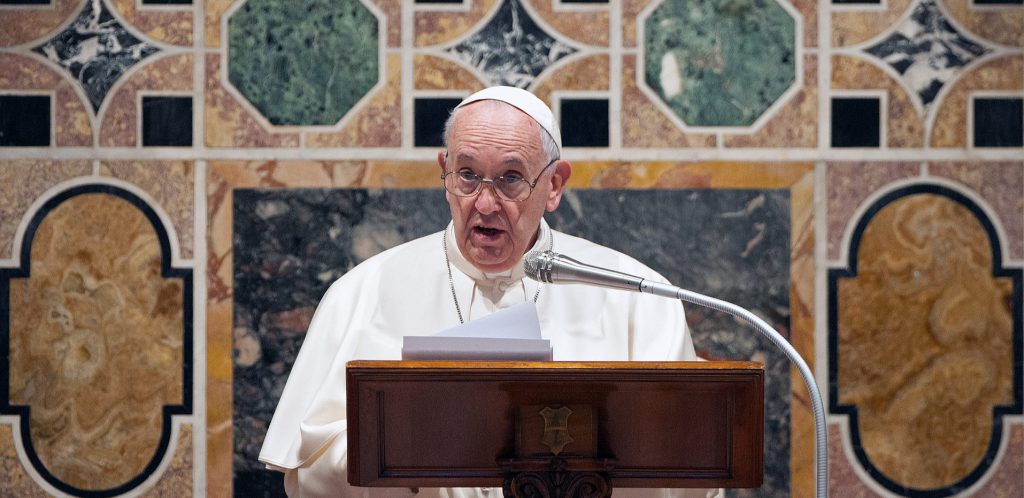
Published November 4, 2021
Let’s assume, for the moment, that President Biden’s account of his meeting with Pope Francis is accurate. Let’s assume, because we can’t know for sure, that the pope told Joe Biden he is a “good Catholic” and that the president should “keep going to Communion.” There are any number of reasons to doubt the account, but let’s assume that it’s true.
What difference does it make?
Some have argued that the pope’s reported comments are the definitive word on the matter. We can finally stop talking about Communion and abortion because the president said the pope said it’s okay. End of discussion.
That is a rather gnostic view of things. Why should we set aside all the pope’s public statements about abortion (“It’s murder”), all the discussions he’s had with U.S. bishops in person or through his representatives – to say nothing of Scripture, Tradition, the Catechism, the Code of Canon Law – and make the interpretive key this one thing Francis supposedly said in a private conversation?
That’s not saying Pope Francis didn’t say what Biden claims he said – remember, we’re assuming for the sake of argument that it’s true. I am saying I don’t see how one can insist Pope Francis wants to somehow communicate his “true” wishes to the U.S. bishops through a game of presidential telephone without thereby suggesting the pope is some kind of a sociopath.
Now, I for one am prepared to believe the pope said exactly what the president claims he said. And if he did, then I wonder if the pope expected the president to share this news – and little else – with the press. And I wonder if the pope considered, or cared, that within a few hours of their meeting, the president would be urging his 31.5 million Twitter followers to support candidates who are “absolutely committed” to abortion rights. Because that’s precisely what Biden did:
The pope may have not expected this – one hopes he didn’t expect it – but to anyone with even a passing familiarity with how these things play out in American media and American politics, it’s the least surprising thing in the world. The president received the papal seal of approval – “Good Catholic. . .keep going to Communion” – and then resumed his previously scheduled campaign for abortion without missing a beat.
One wonders if the pope is aware that the U.S. Supreme Court is as close as it has ever been to overturning Roe v. Wade (imagine: a developed country actually rolling back the abortion license) and that he is, more than ever, perceived as an ally of the Church’s primary opposition and counter-witness in that fight.
It is obvious that Pope Francis prefers a pastoral approach marked by dialogue rather than conflict, mercy rather than judgment. He contends that this approach ensures that the freshness and full flavor of the Gospel are on full display. And so it does.
Yet there’s something strange about the narrative that would hold up Pope Francis’ example of dialogue and engagement as a counterpoint to the U.S. bishops, as if that approach has never been tried here before. It has been tried. And tried. And tried. And after four decades of trying, Joe Biden has gone from wavering uncertainty on the issue of abortion to full-throated advocacy for abortion as a fundamental human right.
One wonders if the Holy Father knows this. Does he know that the model of engagement he advocates has been the pastoral status quo (with few exceptions) for more than 40 years, and that Biden (and others) have used that interminable dialogue as a pretense for using their Catholic faith as political cover for promoting abortion. The freshness of that dialogue turned rancid long ago.
Any pastor with an ounce of goodwill should look for common ground where it can be found. Every pastor with any sense knows that persuasion without trust is nearly impossible. But how much damage must be done to bodies and souls, how much division must be sown in the Church, before a pastor realizes his goodwill and trust are being abused? Who does it help to continue down this path for decade after decade of quickening failure? Who benefits?
Surely, this hasn’t benefitted our political life, which continues to suffer from this deepest of partisan divisions. Surely, it is not the women and men who have been sold the lie that killing an unborn baby will solve some other problem. Surely, the 60+ million babies aborted since Roe v. Wade have not benefitted. Has any seasoned pro-choice politician benefitted from this interminable dialogue, except in the sense of having their consciences numbed sufficiently to make their tireless advocacy for evil less bothersome?
And what about the next generation of public servants? Imagine a young, pro-life Democrat who wants to run for office. She insists to her own party that abortion is incompatible with justice, human dignity, and her deepest religious beliefs. Now imagine her trying to make that argument to the Catholics in party leadership who long ago crossed that moral Rubicon. Imagine her wanting to stand for life and having the pope’s own words thrown back in her face.
Perhaps our bishops are worried that if they upset the status quo, their people will stop listening to them. Perhaps they fear people will stop going to Mass. Or that Catholics will disregard the Church’s other teachings. Or that people will accuse them of being partisan. Perhaps the bishops are worried that if they upset the status quo their dioceses will face financial pressures and parish closings. Maybe they’re worried they will be painted as out of touch with Rome.
But then, all of this is happening already.
So, again, the bishops should ask themselves: Who benefits from the status quo?
© 2021 The Catholic Thing.
Stephen P. White is executive director of The Catholic Project at The Catholic University of America and a fellow in Catholic Studies at the Ethics and Public Policy Center.
Stephen P. White is a fellow in the Catholic Studies Program at the Ethics and Public Policy Center. Mr. White’s work focuses on the application of Catholic social teaching to a broad spectrum of contemporary political and cultural issues. He is the author of Red, White, Blue, and Catholic (Liguori Publications, 2016).












